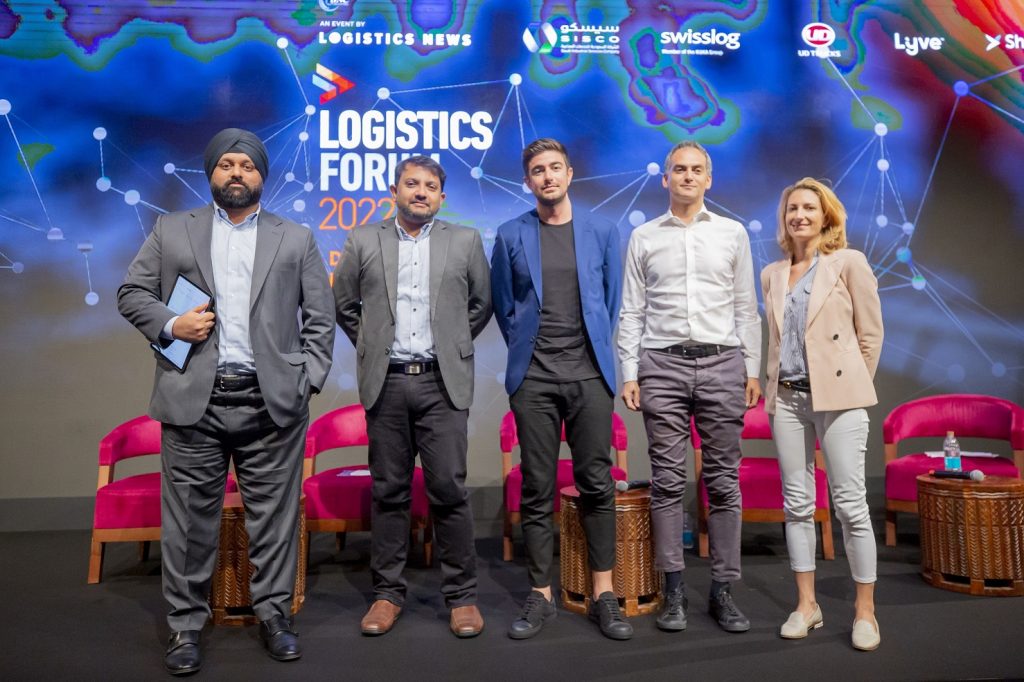The logistics sector is undergoing a transformation with technology playing crucial role. We look at how various technologies – blockchain, artificial intelligence, machine learning, big data & data analytics, automated solutions – are reshaping the industry to make it leaner and efficient.
The Logistics News ME Forum was held on 29 March 2022, at Sofitel Dubai The Palm.
 “The Logistics Forum at the Sofitel Dubai The Palm was an informative session. Participating and listening to other innovative, tech-driven organisations on how innovation is driving logistics forward was very insightful.
“The Logistics Forum at the Sofitel Dubai The Palm was an informative session. Participating and listening to other innovative, tech-driven organisations on how innovation is driving logistics forward was very insightful.
“Each panel member brought their own thoughts to the table and together we delivered the panel of the day. We spoke about the acceleration of innovation in logistics due to the pandemic, how we service different industries, and most importantly, how only by working together, we will be able to drive logistics forward. Look forward to the next one.”
Adel Hamwi, Co-Founder & CEO, PalletPal
 “Logistics and supply chain are highly complex operations that have been behind the eight-ball when compared to the expectations of customer demand which is fuelled by the digitisation of the retail and parcel world. Through the pandemic a lot of the weaknesses of our (logistic and supply chain) ecosystem was exposed and that expedited the digitisation of it to address customer demand and to build scalability and resilience to cater to the needs of tomorrow.
“Logistics and supply chain are highly complex operations that have been behind the eight-ball when compared to the expectations of customer demand which is fuelled by the digitisation of the retail and parcel world. Through the pandemic a lot of the weaknesses of our (logistic and supply chain) ecosystem was exposed and that expedited the digitisation of it to address customer demand and to build scalability and resilience to cater to the needs of tomorrow.
“As we keep making advancements and developing better systems, operations, and experiences for the customer, we are looking into adopting the next generation of digitisation through blockchain and other AI, hardware, mobility applications. Through consistent engagement with our customers, regulators, and internal employees we see us on the forefront of developing and deploying the systems and processes across our ecosystem.”
Angad Singh, Global Director – Innovation, Aramex
 “Supply chain is one of the most complicated endeavours humans have ever engaged in and it takes place millions of times a day and affects everyone of us. As a provider of Robotic Process Automation (RPA) for Logistics, one needs to have the in-depth domain knowledge to create value and integrate with legacy industries such as logistics and supply chains. Having said that, I see logistics and distribution players catching up fast with the demand for software automation and other cutting-edge technology. The attention and budget allocation the above topic gets at C-Level, helps to encourage skilled tech players to come up with new solutions, and the drive for full digitisation.
“Supply chain is one of the most complicated endeavours humans have ever engaged in and it takes place millions of times a day and affects everyone of us. As a provider of Robotic Process Automation (RPA) for Logistics, one needs to have the in-depth domain knowledge to create value and integrate with legacy industries such as logistics and supply chains. Having said that, I see logistics and distribution players catching up fast with the demand for software automation and other cutting-edge technology. The attention and budget allocation the above topic gets at C-Level, helps to encourage skilled tech players to come up with new solutions, and the drive for full digitisation.
“Harnessing a combination of technologies like AI, machine learning, and predictive analytics allows companies to automate processes from rate inquiries over order creations to invoicing and improve partner relationships to create frictionless customer experiences that increase satisfaction and boost sales.”
Carolin-Carmen Neubauer, Chief Operating Officer, COO and Co-Founder, FERO Ai
 “The pandemic put logistics under the spotlight, accelerating its fusion with technology – and forcing the logistics industry to catch up.
“The pandemic put logistics under the spotlight, accelerating its fusion with technology – and forcing the logistics industry to catch up.
“Currently, it is impossible to meet customer demands, let alone provide an excellent customer service without the digitisation of logistics. With customer expectations rising, and competition compressing delivery time – technology is expected to bring accuracy and reliability into operations.
“Businesses that digitise their logistics experience the multiple benefits of increased visibility into their last-mile logistics. Their customers can easily track their order, access delivery status and ETA without having to reach out to customer service. Since the driver is at the core of operations, technology must be as user-friendly and straightforward as possible for them.”
Karim Bakhache, Vice President Strategy, Lyve Global
 “This is an exciting time for the supply chain and logistics industry as stakeholders rapidly realize the true potential of logistics transformation using modern technologies like AI, machine learning, predictive intelligence, blockchain, and more.
“This is an exciting time for the supply chain and logistics industry as stakeholders rapidly realize the true potential of logistics transformation using modern technologies like AI, machine learning, predictive intelligence, blockchain, and more.
“AI is helping on-demand delivery providers, retailers, manufacturers, and logistics service providers build intelligent and self-governing logistics operations. For instance, it enables businesses to create highly efficient delivery routes, optimize capacity, enhance driver management, reduce carbon footprint, and drive cost-efficient selection of logistics partners. Then we have disruptive techs like predictive intelligence, helping logistics stakeholders build proactive supply chains by gaining critical insights into delays, exceptions, and emergencies.
“Blockchain will empower businesses and drive high levels of financial transparency and traceability. With demand for global trade skyrocketing, there is a need for supply chain stakeholders to ensure seamless B2B and international payments, and Blockchain will play a critical role here.”
Mohamed Reza, Vice President, Shipsy

